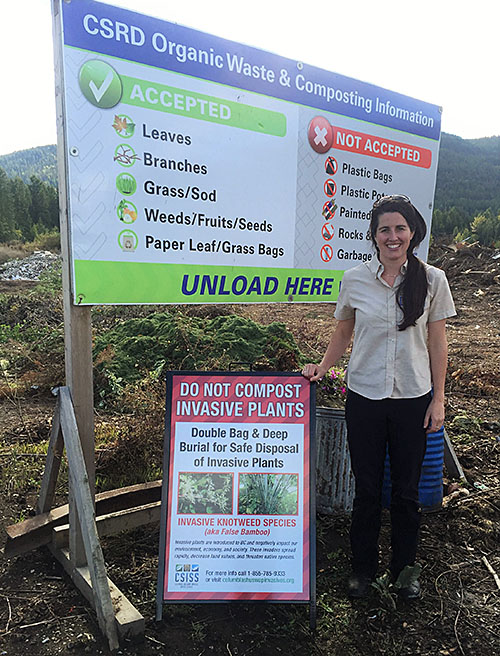
As the Columbia Shuswap Invasive Species Society (CSISS) has discovered new sites where yard waste dumping has led to invasive plant infestations – both within regional landfills and at illegal dumping sites it is encouraging people to stop dumping yard waste.
“Invasive plant infestations may result from plant parts that re-sprout or seeds that spread from yard-waste dumping,” CSISS Executive Director Robyn Hooper said in a statement, “The key is prevention and ensuring that invasive plants are double bagged, and deeply buried at the landfill – not put into any yard-waste or compost systems, or illegally dumped.”
Invasive species are non-native species with the potential to quickly take over and cause environmental, social, or economic impacts. Humans contribute to the spread of invasive species in many ways: the horticultural industry, recreational activities like boating, and through improper disposal.
Compost or yard waste zones are a major concern for invasive plant infestations, as some invasive plants can re-sprout from small stem or root fragments. If compost material has the potential to later be used and distributed, it could cause major issues if it has been contaminated with invasive plant material and seeds. The invasive plant knotweed is one of the biggest concern as it easily spreads from tiny fragments of its root and stem cuttings, and it has been spotted growing at a few sites in landfills, including near yard waste piles. “Knotweed should not be composted or put in yard-waste, but rather buried in the landfill to reduce risk of spread” says CSISS Executive Director Robyn Hooper, “We encourage all landowners to contact CSISS regarding proper knotweed management.”
In response to the increasing amounts of invasive plants being found in landfill and transfer stations’ yard waste piles, CSISS and the Columbia Shuswap Regional District (CSRD) have collaborated to create ‘Do Not Compost Invasive Plants’ signage and encourage landowners to contact CSISS with any questions.
Yard waste is not the only dumping issue: Aquatic Invasive Species
Improper disposal of yard waste is not the only issue.
Aquariums and garden ponds may contain invasive species that are often improperly released into the wild. Yellow flag iris, fragrant water lily, and parrot’s feather are all examples aquatic plants originating from the aquarium/aquatic plant trade. Once let loose into the wild they can completely take over lakes, ponds, wetlands, and riparian habitat, outcompeting native species and altering the ecosystem. Even the notorious Eurasian Watermilfoil, found in Shuswap Lake and Lake Revelstoke, is suspected to be introduced to North America as an aquarium decorative plant, later being dumped and found spreading throughout the continent.
Never release unwanted aquarium plants, fish or live bait, or non-native animals (like the American Bullfrog) into natural areas. CSISS has teamed up with the Invasive Species Council of BC’s “Don’t let it loose” campaign which educates pet or aquarium owners and others to be responsible with the containment and disposal of plants and animals. The Columbia Shuswap is currently American Bullfrog-free and we’d like to keep that way!
Proper disposal of yard waste
CSISS recommends that when disposing of an invasive plants, they should be double-bagged and sealed, then carefully transported so plant material does not spread. Invasive plants should be brought to a landfill or transfer station to the designated disposal site for deep burial. Do NOT compost invasive plants or put in yard waste piles. For a list of invasive plants designated for deep burial please visit: http://columbiashuswapinvasives.org/noxious-weed-list-for-the-columbia-shuswap/
CSISS will continue to work with land owners and increase public awareness to encourage proper disposal of invasives and reduce their spread.
To keep your community invasive-free, spread awareness and keep an eye out for invasive plants! You can report invasive species by using BC’s “Report-A-Weed” app on your phone or contact CSISS at info@columbiashuswapinvasives.org or 1-855-785-9333.
The Columbia Shuswap Invasive Species Society is a non-profit organization dedicated to the prevention, management and reduction of invasive species in the Columbia Shuswap Regional District. CSISS is thankful for the generous support of the Columbia Basin Trust, the Columbia Shuswap Regional District, the Province of BC, and other partners.
To learn more about invasive species in the Columbia Shuswap region please visit: http://www.columbiashuswapinvasives.org



